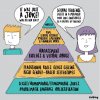What role do men have in the work of challenging gender inequalities and building gender justice? This chapter examines the experiences of men as deliberate agents of a feminist masculinity politics, exploring key challenges in men’s efforts to take up profeminism. This first challenge is overcoming one’s own sexist and violence-supportive attitudes and behaviours. Men may be disinterested in or resistant to efforts to involve them in progressive change because of widespread sexist and violence-supportive attitudes and relations.
Violence
Shift, a violence prevention project at the University of Calgary, has released “Supporting Best Practices: Guidelines for Funding Programs That Engage and Mobilize Men & Boys in Violence Prevention”. Although these guidelines were written for Alberta, Canada, they have a wider relevance in guiding funding and support for efforts to engage men and boys in violence prevention.
Men’s responses to #MeToo, and other forms of feminist advocacy on rape and sexual harassment, range from enthusiastic support to hostile backlash. There are common forms of resistance among men to these campaigns, including defensive denials that men’s violence is routine, a focus on ‘other’ men, and complaints that #MeToo has ‘gone too far’. And for many men, there is simply mute discomfort. Masculinity is implicated directly in men’s perpetration of rape and sexual harassment, but also in men’s widespread inaction or complicity in the face of men’s violence against women.
As part of the White Ribbon Campaign in Australia, White Ribbon Australia produced the White Ribbon Policy and Research Series, focused on the prevention of men’s violence against women. This comprised a series of papers, with the first in 2010 and the last in 2017. Here, we have collected these papers.
2017
Facing Patriarchy challenges current thinking about men’s violence against women. Drawing upon radical and intersectional feminist theory and critical masculinity studies, the book locates men’s violence within the structures and processes of patriarchy.
The UN Women Training Center has developed a great resource for men to educate ourselves: the Self-Learning Booklet: Masculinities and Violence against Women and Girls (2016).
The booklet was developed as the result of a series of training courses that aim to strengthen capacities of development practitioners and advocates to understand, integrate and address critical gender issues in their lives and work. This tool aims to assist both UN and non-UN staff to better understand the issues of masculinities in relation to violence against women and girls.
Research tells us that socially constructed gender norms which associate masculinity with power, violence and control can play a role in driving conflict and insecurity.
The SHED Manual: For workers engaging in men’s behaviour change to shed abusive beliefs and violence (2013) was developed over almost 20 years of practice in rural Australia by Chris Laming. The SHED (Self Help Ending Domestics) Project engaged with men and challenged them to look at themselves, as though in a mirror. It was ‘time and space for men to face who they are and what they have become and a chance to change what is not good’.
Sexist jokes often are dismissed or excused as harmless fun. Yet they have real, negative effects in the world. They are linked to sexist and violent behaviour, they worsen gender inequalities, and they increase tolerance for violence against women.






